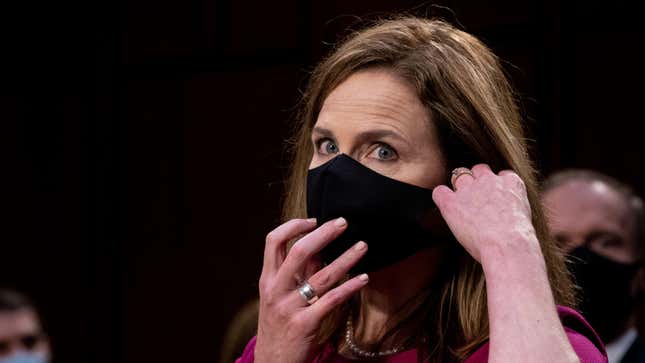
On Monday, the Senate Judiciary Committee kicked off its confirmation hearings for Judge Amy Coney Barrett, President Trump’s nominee to replace the late Justice Ruth Bader Ginsburg. If she’s confirmed, she’ll tip the scale of the Supreme Court to a 6-3 conservative majority, leaving the future of many important cases hanging in the balance, climate cases included.
Among those could be Juliana v. U.S., the landmark lawsuit that 21 youth plaintiffs waged against the U.S. government beginning in 2015 for taking insufficient action on climate change. Earlier this year, the Ninth Circuit Court of Appeals “reluctantly” tossed the case out. The plaintiffs and their lawyers are now waiting to see if the full appeals court will uphold the decision to scrap the suit.
“We anticipate that in the next month or two, we’ll see a decision made by the Ninth Circuit,” Julie Olsen, chief legal counsel at Our Children’s Trust, who is leading the Juliana lawsuit, said. “If they deny the petition then the next step for the plaintiffs would be to petition the Supreme Court for review of the case.”
If the case heads to the high court, whether or not Barrett’s confirmation is pushed through could impact its future. Barrett doesn’t have an extensive environmental record to draw from, but at its core, Juliana v. U.S. is not an environmental lawsuit but a constitutional one. Unlike major environmental cases like Massachusetts vs. EPA (a case focused on whether the agency could regulate greenhouse gases under the Clean Air Act) or cities’ legal efforts to hold fossil fuel producers liable for climate damages, Juliana focuses on how the government’s actions that perpetuate climate change have “violated the youngest generation’s constitutional rights to life, liberty, and property.” Olsen said this premise gives the case strength.
“We have framed the case that way so it could appeal to a broad number of judges and justices,” she said.
But Barrett’s approach to constitutional law doesn’t necessarily look like a promising source of support for the youth plaintiffs. Barrett clerked under the late, notoriously staunch conservative Supreme Court Justice Antonin Scalia. Like her former boss, the nominee is a strict constitutionalist—she takes a narrow view of the scope of the document in order to deny people rights based on her own worldview. But the Juliana case hinges on judges’ willingness to interpret actions that further the climate crisis as affronts to the rights the Constitution affords.
“She’s written that rather than following precedent, justices should really just follow their own personal view of how they read the Constitution,” Benjamin Driscoll, head of the judiciary program at the League of Conservation Voters, said. “Particularly when it comes to a case like Juliana, which involves a protection that hasn’t otherwise been recognized in the courts, that’s very concerning.”
Also troubling to Driscoll is Barrett’s record on the issue of “standing.” In legal terms, who has “standing” essentially determines who has the right to sue. To have this right, plaintiffs must demonstrate that their case will address an injury or harm that they’ve suffered, that the defendant in their suit had some role in perpetrating that harm, and that the lawsuit could repair that damage.
In one 2019 case, Barrett denied standing to a woman challenging illegal debt collection practices by saying the plaintiff failed to show injury—even though she had personally been affected. In another case, Barrett denied standing to an applicant to a job who met the experience requirement but was denied employment due to their age. Barrett supported the argument that job applicants aren’t protected under employee discrimination protections, again taking a narrow reading of the legal language.
Even more pertinently, Barrett dismissed a case earlier this year about public parks in Chicago, finding that environmental organizers lacked the standing to sue the city over a construction project slated for a local park that they found would inhibit their inalienable rights to the use of public resources—a doctrine known as “public trust.”
“She ruled against the party by basically saying that they didn’t prove their connection between a harm to the environment and the harm to themselves,” Driscoll said.
In that opinion, Barrett claimed that the public trust doctrine is a matter of state law, and one that can only be applied to some particular federal lands, not to people.
“The Juliana plaintiffs argue that the public trust doctrine is also a matter of federal law, and that it applies to the global atmosphere,” Michael Burger, executive director at Columbia University’s Sabin Center for Climate Change Law, wrote in an email. Addressing the Chicago case, he said “the opinion makes it quite clear she would likely vote in favor of dismissal.”
Despite these stiff headwinds, Olsen said she still had hope for a positive outcome if Barrett is nominated and the case goes to the high court.
“There’s no question that the founders of our nation intended for the very foundations of life, to be part of our unalienable rights, and they very much understood that the air, the water, the land, the climate, were the foundations of liberty,” she said. “I have no doubt that judges will find have to find that those are foundational to our democracy,” she added optimistically.
Burger wasn’t so sure, but he said that whether or not the plaintiffs prevail in court, their case has accomplished something remarkable: changing how people think about legally protecting the climate.
“The youth plaintiffs in Juliana broke through the techno-wonkery of climate policy and made clear that climate change is an existential crisis that directly harms them, as individuals, and their personal liberty,” he said. “This case changed the game.”
Update, 11/2/20, 3:30 p.m.: A previous version of this post stated that the Juliana case focuses on how the government’s inaction on climate change violated young people’s constitutional rights, but the case focuses on the government’s affirmative actions, not inaction. We regret the error.